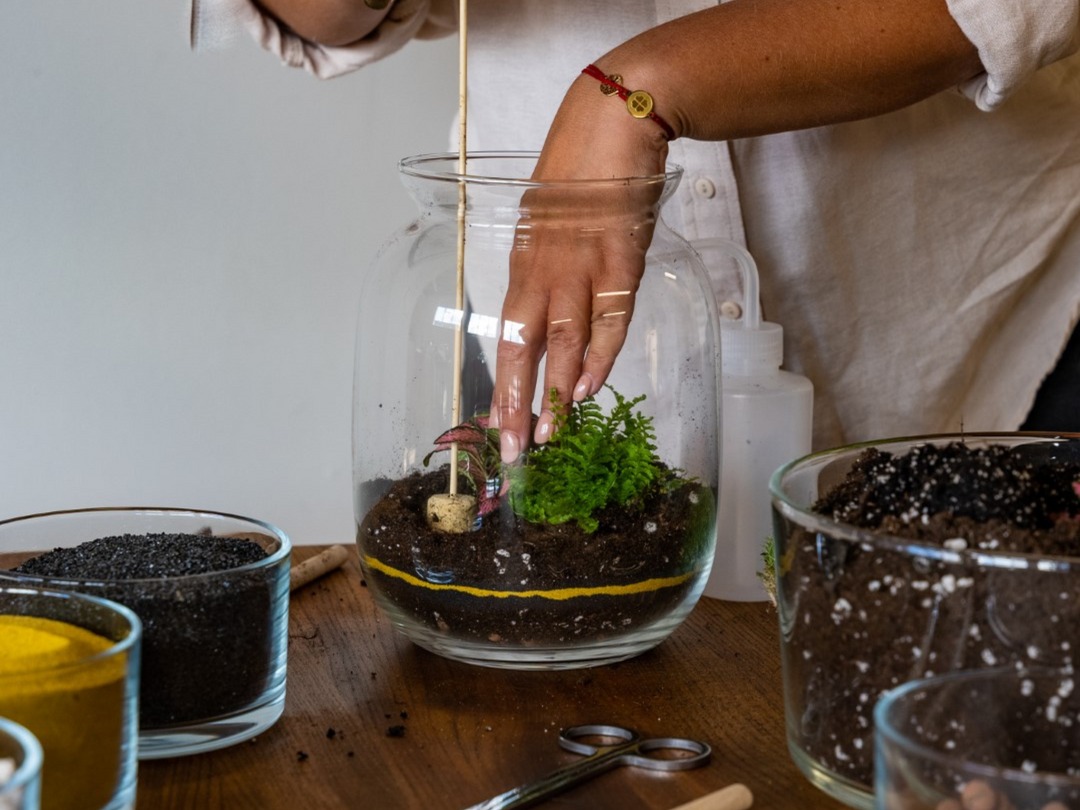
Terrarium workshops teach participants to build small, living ecosystems inside glass containers. These sessions are hands-on, relaxing, and well suited to teams, families, and hobbyists in Singapore.
TL;DR
The terrarium workshops are 1–1.5 hour hands-on sessions. They include materials and clear guidance. They suit corporate teams, schools, and casual hobbyists. Virtual options with delivered kits are available.
What a terrarium workshop is and why it matters
A terrarium workshop shows you how to create a mini plant ecosystem. A terrarium is a small, transparent container with plants that demonstrate basic ecological cycles.
Workshops blend craft, science, and stress relief. They let beginners see plant care and water cycles in action.
Workshop logistics: locations, duration, and cost
Workshops usually run between one and one and a half hours. Sessions often happen at studio spaces across Singapore or at booked event venues.
Most providers include all materials: glass container, soil, substrate, plants, and decorations. Prices vary by type and group size; contact providers for exact quotes.
EcoPonics offers studio and offsite formats and delivers kits for virtual events. See the EcoPonics terrarium workshops page for details.
Types of terrarium workshops you can attend
Workshops come in several formats to match skill and interest. Typical options include classic closed terrariums, succulent or cactus jars, and airplant displays.
Each format uses different plants and care rules. Cactus workshops use dry substrates while closed terrariums use moisture-retaining mixes.
What materials are provided
Most workshops supply a full materials kit. Kits usually include a glass jar, gravel, activated charcoal, potting mix, plants, and decor.
Instructors bring tools and step-by-step guidance. Virtual sessions ship the same kit ahead of time to participants.
Educational content and science taught
Workshops teach photosynthesis, the water cycle, and basic ecology. In short, participants learn how plants exchange gases and recycle moisture.
These sessions often map to school science topics. They work well for enrichment classes and informal science learning.
Benefits: stress relief, creativity, and team bonding
Terrarium creation reduces stress and promotes focus. The repetitive, hands-on work eases anxiety and boosts mood.
They also build teamwork through shared planning and design. Corporate groups often use them as engaging team-building activities in Singapore.
Suitability for children, schools, and corporate groups
Workshops suit children, parents, and educators. Instructors adapt content by age and learning objective.
For corporate events, providers support groups from five to twenty-five participants. Many providers include facilitation for team challenges and discussion prompts.
Maintenance after the workshop
After the session, most terrariums need minimal care. Closed terrariums require indirect light and occasional airing if condensation is heavy.
Open terrariums and succulent jars need sparse watering and bright light. Instructors give clear follow-up care steps at the end of each workshop.
Booking, virtual options, and practical tips
Booking usually requires an email or phone inquiry and deposit. Weekends and evenings book fast, so reserve early for corporate dates.
Virtual terrarium workshops include a mailed kit and live online instruction. They work well for remote teams and safe family gatherings.
What a Terrarium Workshop Is and Why It Matters
A terrarium workshop introduces participants to the art and science of creating a mini plant ecosystem. A terrarium is essentially a small, transparent glass container filled with plants, soil, and decorative elements that demonstrate how nature’s cycles—like photosynthesis and the water cycle—work on a small scale.
These workshops combine creativity, relaxation, and learning. They are particularly appealing because they allow participants to craft something beautiful while gaining an appreciation for how plants grow and sustain themselves. Building a terrarium is both meditative and educational, making it a meaningful break from digital distractions.
The popularity of terrarium workshops in Singapore reflects growing interest in sustainability, mindfulness, and eco-friendly hobbies. As participants watch their terrarium thrive, they are reminded of the importance of balance in nature and daily life.
Workshop Logistics: Locations, Duration, and Cost
Terrarium workshops in Singapore typically last between one and one and a half hours. Most sessions are held in studio spaces located across the city, though many providers also host private workshops at offices, schools, or event venues.
Every session usually includes a complete materials package—glass container, soil, substrate, decorative stones, and plants—so attendees do not need to bring anything. Prices can vary depending on group size, container type, and session format. It’s best to contact workshop providers directly for a detailed quote.
For instance, EcoPonics, a well-known workshop provider in Singapore, offers flexible options including in-studio sessions, offsite corporate events, and virtual workshops with pre-delivered kits. Their programs are designed to accommodate different group sizes and experience levels, ensuring a smooth, enjoyable experience for all.
Types of Terrarium Workshops You Can Attend
Terrarium workshops come in several creative formats tailored to different preferences and skill levels. Common types include:
- Closed Terrariums: These are self-sustaining ecosystems where moisture recycles naturally. They typically feature moisture-loving plants like moss and ferns.
- Open Terrariums: Ideal for succulents and cacti that thrive in dry environments.
- Air Plant Displays: These use plants that grow without soil, creating elegant and minimalist arrangements.
Each style teaches different plant care principles—from maintaining humidity in closed terrariums to ensuring proper sunlight exposure for succulents. Participants can choose based on their design taste or maintenance preference.
What Materials Are Provided
Most terrarium workshops in Singapore include a comprehensive kit containing everything needed to build your miniature garden. A standard kit usually includes:
- Glass jar or container
- Gravel or pebbles for drainage
- Activated charcoal to prevent mold
- Potting mix or substrate
- Plants suited to your chosen terrarium type
- Decorative items like figurines or stones
All tools are provided on-site, and instructors guide you step by step through the layering process. For virtual workshops, the same kit is delivered in advance, ensuring participants can follow along seamlessly from home or office.
Educational Content and Science Taught
Beyond being a craft activity, terrarium workshops incorporate essential lessons in biology and ecology. Participants learn how plants carry out photosynthesis, recycle moisture, and interact with their environment.
Many workshops are designed to align with school science curricula, making them ideal for enrichment programs or classroom activities. Students can visualize concepts like the water cycle, carbon exchange, and ecosystem balance through hands-on experience.
Benefits: Stress Relief, Creativity, and Team Bonding
Creating a terrarium offers powerful psychological and social benefits. The calm, repetitive nature of layering soil and arranging plants encourages mindfulness and stress reduction. Participants often find the process meditative and soothing.
For teams, these workshops serve as excellent corporate bonding activities. Collaborating on design ideas fosters teamwork, creativity, and communication. The shared sense of accomplishment when the terrarium is completed strengthens group morale and builds connections beyond the office environment.
Suitability for Children, Schools, and Corporate Groups
Terrarium workshops are highly adaptable and suitable for a wide range of audiences. Instructors customize the content based on participants’ age, skill level, and objectives.
- Children and Students: Learn about ecosystems in an interactive, engaging way.
- Families: Enjoy quality time while creating something lasting together.
- Corporate Teams: Strengthen collaboration through shared creative problem-solving.
For companies, providers can accommodate anywhere from five to twenty-five participants per session, often adding team-building elements or group challenges to make the experience more dynamic.
Maintenance After the Workshop
Terrariums are known for being low-maintenance. Closed terrariums typically need only indirect sunlight and occasional ventilation if condensation builds up. Open terrariums, especially those with succulents or cacti, require minimal watering and plenty of light.
Instructors always provide a care guide at the end of each session, ensuring that participants can keep their creations healthy for months or even years. With proper attention, a terrarium can become a long-lasting piece of living decor.
Booking, Virtual Options, and Practical Tips
Booking a terrarium workshop in Singapore is straightforward. Most providers accept reservations through email or phone, and group sessions often require a deposit. Because weekends and evenings are in high demand, early booking is recommended—especially for corporate or school events.
For remote or hybrid teams, virtual terrarium workshops are an excellent alternative. Kits are shipped directly to participants, and a live instructor guides everyone online. This option maintains the interactive nature of the workshop while allowing flexibility for those working from home.
Where to Find Trusted Providers in Singapore
Singapore hosts several reputable terrarium workshop providers, including EcoPonics, which offers in-studio, offsite, and virtual options for individuals, schools, and companies. Participants can also explore community centers or educational programs for plant-related workshops and sustainability activities.
For additional learning, Singapore’s environmental and horticultural resources—such as Gardens by the Bay or the National Parks Board—offer complementary programs about plant care and ecosystem awareness.
Where to find trusted providers in Singapore
Several local studios run regular classes and private bookings. EcoPonics is one example that runs studio, school, and corporate sessions with delivered kits for virtual events.
Government and educational resources can support outdoor plant projects. See for plant info and community programs.
Summary
Terrarium workshops give practical plant skills, calming creativity, and social bonding in short, guided sessions. They match school curricula, corporate goals, and casual hobby needs. Choose a provider with kit delivery and clear follow-up care instructions to get the best results.
Frequently asked questions
Where are terrarium workshops held in Singapore?
Most workshops run at studios or booked venues across the island. Virtual options deliver kits to participants.
How long does a typical terrarium workshop last?
Workshops commonly last 60 to 90 minutes and include setup and a Q&A session.
What is the cost of attending a terrarium workshop?
Prices vary by provider, terrarium type, and group size; request a quote for exact fees.
Are workshops suitable for children and schools?
Yes. Instructors adapt content and safety measures for younger participants.
Can they be used for corporate team building?
Yes. Terrarium workshops encourage collaboration, communication, and creative problem solving.
How do I care for my terrarium after the workshop?
Care depends on the terrarium type. Closed jars need indirect light and little water; open jars need occasional watering.
Quick resources and credibility notes
EcoPonics has conducted thousands of hands-on sessions in Singapore. For horticultural therapy context, see the American Horticultural Therapy Association.
If you want to book, contact your chosen provider early. Weekends fill quickly for corporate and school bookings.




